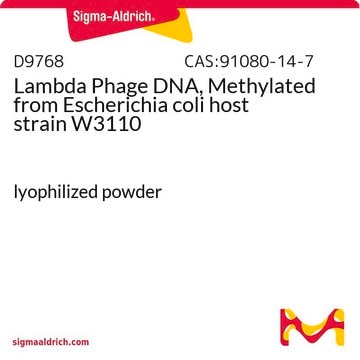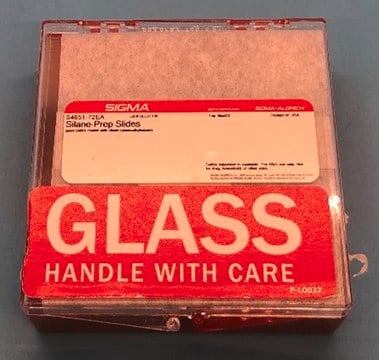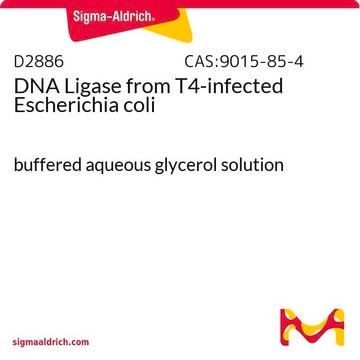D3779
Lambda Phage DNA, Methylated from Escherichia coli host strain W3110
solution
Iniciar sesiónpara Ver la Fijación de precios por contrato y de la organización
About This Item
Productos recomendados
grade
for molecular biology
Quality Level
form
solution
mol wt
31.5 × 103 kDa
48 kb
concentration
556 μg/mL
suitability
suitable for substrate for restriction endonucleases
shipped in
dry ice
storage temp.
−20°C
¿Está buscando productos similares? Visita Guía de comparación de productos
General description
Phage DNA is isolated from infected E. coli, passed through a series of enzymatic steps before final phenol-chloroform extraction. This methylated lambda DNA is not completely digested by Bcl I, Cla I, Mbo I, Mbo II, Taq I or Xba I whereas non-methylated lambda DNA(product number D3654) is only partially cleaved.
Specificity
Unique restriction sites: Apa I,Nae I, Nar I, Nhe I, PaeR7 I, SnaB I, Xba I and Xho I. Methylated lambda is partially cleaved by Bcl I, Cla I, Mbo I, Mbo II, Taq I and Xba I.
Application
Lambda Phage DNA, Methylated from Escherichia coli host strain W3110 has been used:
- in magnetic tweezers measurements
- in the preparation of 35S-labeled DNA
- in the preparation of coupled standards (DNA + RNA)
Lambda Phage DNA, Methylated from Escherichia coli host strain W3110 is suitable for use as a substrate for restriction enzymes. It was used to study the attractive forces between condensed DNA double helix by combining single-molecule magnetic tweezers and osmotic stress. 35S-labeled Lambda Phage DNA, Methylated from Escherichia coli host strain W3110 was also used to standardize a method of measuring dissolved DNA in seawater.
The lambda phage has an icosahedral head and a long tail terminating in a single fiber. At both ends of the 5′ termini are complementary 12-nucleotide single strand sequences that contribute to the cohesive ends (cos region) of the DNA. The tail of the phage latches on the host outer membrane receptor and injects phage DNA into the cell. The phage converts the E. coli to a lysogenic state in which the phage functions are repressed and the phage genome may remain dormant (prophage) for a long time. This property is seen in bacteriophages that carry CII and CIII genes that are responsible for CI expression. Bacteriophages with CI mutation in the CI gene are able to maintain a lysogenic state at defined temperatures.
Infecting E. coli strain W3110 with lambda C1857 strain creates E. coli lysogen cultures. The phage is released from E. coli cell pellets by lysing with a high salt buffer, pH 8.0. The crude mixture is passed through a series of enzymatic steps, multiple cesium gradients, and phage DNA is dialyzed against 1 mM Tris-HCl, pH 8.0, and 1 mM magnesium chloride. The DNA is finally extracted by phenol-chloroform solution.
Infecting E. coli strain W3110 with lambda C1857 strain creates E. coli lysogen cultures. The phage is released from E. coli cell pellets by lysing with a high salt buffer, pH 8.0. The crude mixture is passed through a series of enzymatic steps, multiple cesium gradients, and phage DNA is dialyzed against 1 mM Tris-HCl, pH 8.0, and 1 mM magnesium chloride. The DNA is finally extracted by phenol-chloroform solution.
Unit Definition
One O.D. (A260) is approximately 50 μg of DNA
Physical form
DNA is supplied in a solution of 10 mM Tris-HCl (pH 8.0), with 1mM EDTA.
related product
Storage Class
10 - Combustible liquids
flash_point_f
Not applicable
flash_point_c
Not applicable
Certificados de análisis (COA)
Busque Certificados de análisis (COA) introduciendo el número de lote del producto. Los números de lote se encuentran en la etiqueta del producto después de las palabras «Lot» o «Batch»
¿Ya tiene este producto?
Encuentre la documentación para los productos que ha comprado recientemente en la Biblioteca de documentos.
Los clientes también vieron
A novel method for the measurement of dissolved deoxyribonucleic acid in seawater
Brum JR et al
Limnology and Oceanography: Methods, 2, 248-255 (2004)
Nanomechanical fingerprints of UV damage to DNA.
Gwangrog Lee et al.
Small (Weinheim an der Bergstrasse, Germany), 3(5), 809-813 (2007-03-30)
Effects of CO2 perturbation on phosphorus pool sizes and uptake in a mesocosm experiment during a low productive summer season in the northern Baltic Sea
Nausch M, et al.
Biogeosciences (Online) (2016)
A novel method for the measurement of dissolved deoxyribonucleic acid in seawater
Brum J R, et al.
Limnology and Oceanography: Methods, 2(8), 248-255 (2004)
Brian A Todd et al.
Biophysical journal, 94(12), 4775-4782 (2008-03-11)
By combining single-molecule magnetic tweezers and osmotic stress on DNA assemblies, we separate attractive and repulsive components of the total intermolecular interaction between multivalent cation condensed DNA. Based on measurements of several different cations, we identify two invariant properties of
Nuestro equipo de científicos tiene experiencia en todas las áreas de investigación: Ciencias de la vida, Ciencia de los materiales, Síntesis química, Cromatografía, Analítica y muchas otras.
Póngase en contacto con el Servicio técnico













